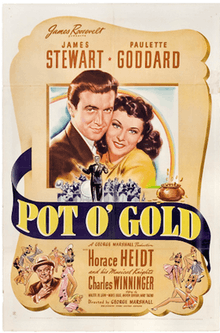Pot o' Gold (film)
Pot o' Gold is a 1941 American romantic musical comedy film starring James Stewart and Paulette Goddard, directed by George Marshall,[1] and based on the radio series Pot o' Gold. The film was released April 3, 1941, eight months before the NBC radio series came to an end. Paulette Goddard's singing voice was dubbed by Vera Van. The film was known as The Golden Hour in the United Kingdom and was re-released in 1946 by Astor Pictures as Jimmy Steps Out.
| Pot o' Gold | |
|---|---|
 1941 Theatrical poster | |
| Directed by | George Marshall |
| Produced by | James Roosevelt |
| Written by | Andrew Bennison Monte Brice |
| Based on | Pot O' Gold 1939--1941; 1946 radio series by Robert Brilmayer Haydn Roth Evans |
| Starring | James Stewart Paulette Goddard Horace Heidt Charles Winninger Mary Gordon |
| Music by | Louis Forbes |
| Cinematography | Hal Mohr |
| Edited by | Lloyd Nosler |
Production company | James Roosevelt Productions |
| Distributed by | United Artists |
Release date |
|
Running time | 86 minutes |
| Country | United States |
| Language | English |
Background
Pot o' Gold was radio's first big-money giveaway program, garnering huge ratings within four weeks of its 1939 debut. The program's success prompted production of the film. The premise of the radio program, created by Ed Byron, was that any person who picked up the telephone when host Horace Heidt called would automatically win $1000. Phone numbers were chosen by three spins on the Wheel of Fortune: (1) choice of phone directory, (2) page number and (3) the line on the page. The series ran on NBC from September 26, 1939 to December 23, 1941 and later a new show by the same name from October 2, 1946 to March 26, 1947 on ABC.
Plot

The film tells of a couple romantically involved despite family feuds.
Jimmy Haskell (James Stewart) is the former owner of a defunct music store. His uncle, C.J. Haskell (Charles Winninger), dislikes music and has long wanted Jimmy to join him in his health food business. Jimmy only agrees after his music store is closed. When Jimmy arrives at his uncle's place, he is confronted by members of the McCorkle family, who play in Heidt's band and often practice outside C.J.'s business. As C.J. hates music, he is infuriated and attempts to stop the band using the police. Unsuccessful, he is thrown a tomato by Jimmy, unintentionally. Jimmy is then made a hero by the band and the McCorkles, who do not know his true identity. Molly McCorkle (Paulette Goddard) falls in love with him.
When Jimmy substitutes for C.J. on the Haskell radio program, two band members find out his identity. They work together to devise a scheme to persuade C.J. to take a vacation. In the meantime, Jimmy takes over the operation of the business and invites Heidt's band to play on the radio. Molly learns Jimmy's identity, and in anger, she says the Haskell program will give away $1000 every week. Jimmy has no choice but to find a way to hand out the cash, and a federal investigator reminds him that using lottery to give the 1000 dollars is illegal.
Jimmy plans to use phone books and a roulette-style game to find winners. The Haskell program grows immensely popular and attracts lucrative advertising contracts. This reconciles the Haskell and McCorkles, paving the way for the marriage between Jimmy and Molly.
Cast
- James Stewart as James Hamilton "Jimmy" Haskell
- Paulette Goddard as Molly McCorkle
- Horace Heidt as Himself
- Charles Winninger as Charles "C.J." Haskell
- Mary Gordon as Mom McCorkle
- Frank Melton as Jasper Backus
- Jed Prouty as J.K. Louderman
- Charles Arnt as Parks (butler)
- Dick Hogan as Willie McCorkle
- James Burke as Police Lt. Grady
- Donna Wood as Donna McCorkle
- Larry Cotton as Larry Cotton, Vocalist
- Art Carney as Radio Announcer
Soundtrack
- Various characters - "Hi, Cy, What's A-Cookin'?" (Written by Henry Russell and Louis Forbes)
- Paulette Goddard (dubbed by Vera Van) with Horace Heidt & His Musical Knights - "Pete the Piper" (Written by Henry Russell)
- James Stewart - "When Johnny Toots His Horn" (Written by Hy Heath and Fred Rose)
- Horace Heidt & His Musical Knights - "A Knife, a Fork and a Spoon" (Written by Dave Franklin)
- Larry Cotton with Horace Heidt & His Musical Knights - "Do You Believe in Fairy Tales?" (Music by Vee Lawnhurst, lyrics by Mack David)
- Paulette Goddard (dubbed by Vera Van) with Horace Heidt & His Musical Knights - "Broadway Caballero" (Written by Henry Russell)
Reception
Stewart later referred to the film as the worst one he ever appeared in.
Nine years later, Stewart did another movie about a big-money radio show, The Jackpot (1950).
References
- Maltin, Leonard; Sader, Luke (2008), Leonard Maltin's Movie Guide: 2009 Edition, Penguin, p. 1089, ISBN 0452289785.
External links
| Wikimedia Commons has media related to Pot o' Gold. |
- Pot o' Gold on IMDb
- Pot o' Gold is available for free download at the Internet Archive
- Pot o' Gold at AllMovie
- Pot o' Gold at the TCM Movie Database
- Pot o' Gold at the American Film Institute Catalog